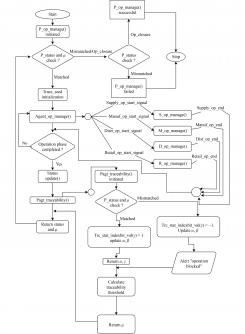Science
Researchers Develop Blockchain Framework for Supply Chain Efficiency

The integration of blockchain technology with intelligent systems offers a promising solution to the challenges faced by global supply chains. A newly published study titled “Constructing an Intelligent Agent-Centric Framework for Supply Chain Traceability with Blockchain Integration,” conducted by researchers Satyananda Swain and Manas Ranjan Patra from Berhampur University in India, presents a comprehensive framework aimed at enhancing supply chain traceability and operational efficiency.
As global supply chains evolve, traditional management methods are increasingly inadequate. Issues such as inadequate traceability, data security vulnerabilities, and inefficient operations impede effective supply chain management. The researchers argue that blockchain technology (BCT) can significantly improve traceability in distributed systems, and when combined with intelligent software agents, the overall security and transparency of supply chains can be enhanced.
Despite the potential benefits, existing research has not adequately addressed the practical integration of blockchain with intelligent agents to meet the complex and dynamic needs of multi-tier supply chains. The framework proposed by Swain and Patra emphasizes a multi-agent system (MAS) as the core component, responsible for overseeing and monitoring blockchain-enabled supply chain operations.
Framework Overview
The proposed framework encompasses a wide-ranging approach to supply chain traceability. It aims to facilitate comprehensive workflow tracking and control, considering both internal and external perspectives of traceability. By leveraging intelligent agents, the framework is designed to enable real-time monitoring and dynamic adjustments throughout the supply chain lifecycle.
The study specifically examines the gasoline manufacturing and distribution supply chain (GMDSC) to validate the framework’s effectiveness. The results indicate that this intelligent agent-centric framework can establish a resilient supply chain, ensuring accurate execution of activities while addressing common issues such as data inaccuracies and the challenges of integrating multiple systems.
Through the case study, the researchers demonstrated that the framework significantly enhances operational capabilities. It allows for improved real-time monitoring, enabling rapid adjustments to supply chain processes as needed. This adaptability is crucial for managing the complexities inherent in modern supply chains.
Publication and Implications
The findings of this research have been published in the journal Frontiers in Engineering Management, Volume 12, Issue 3, spanning pages 558 to 580, with the publication date set for December 2025. The study is accessible via DOI: https://doi.org/10.1007/s42524-024-3118-7.
As companies increasingly seek to optimize their supply chain operations, the insights provided by Swain and Patra’s research could prove vital. The intelligent agent-centric framework not only addresses traceability challenges but also lays the groundwork for future advancements in supply chain management, making it a significant contribution to the field.
-

 Lifestyle3 months ago
Lifestyle3 months agoLibraries Challenge Rising E-Book Costs Amid Growing Demand
-

 Sports3 months ago
Sports3 months agoTyreek Hill Responds to Tua Tagovailoa’s Comments on Team Dynamics
-

 Sports3 months ago
Sports3 months agoLiverpool Secures Agreement to Sign Young Striker Will Wright
-

 Lifestyle3 months ago
Lifestyle3 months agoSave Your Split Tomatoes: Expert Tips for Gardeners
-

 Lifestyle3 months ago
Lifestyle3 months agoPrincess Beatrice’s Daughter Athena Joins Siblings at London Parade
-

 World3 months ago
World3 months agoWinter Storms Lash New South Wales with Snow, Flood Risks
-

 Science3 months ago
Science3 months agoTrump Administration Moves to Repeal Key Climate Regulation
-

 Science2 months ago
Science2 months agoSan Francisco Hosts Unique Contest to Identify “Performative Males”
-

 Business3 months ago
Business3 months agoSoFi Technologies Shares Slip 2% Following Insider Stock Sale
-

 Science4 months ago
Science4 months agoNew Tool Reveals Link Between Horse Coat Condition and Parasites
-

 Sports3 months ago
Sports3 months agoElon Musk Sculpture Travels From Utah to Yosemite National Park
-

 Science4 months ago
Science4 months agoNew Study Confirms Humans Transported Stonehenge Bluestones









